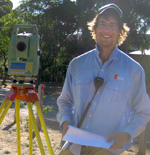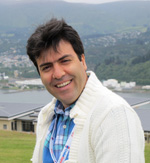Michael Stojanovich, Master of Surveying 
When did you decide to study the Master of Surveying? Was it the influence of your university subjects, or did you intend to further your studies in surveying during secondary school?
I decided to pursue the Master of Surveying during the second year of my undergraduate degree (Bachelor of Sustainable Environments GIS). The major influence for me was studying a geomatics course, which gave me a sample of the type of work surveyors conduct each day. Further research into this career and participating in a week of work experience at a surveying firm made me more determined to graduate and move into the Master of Surveying.
During the Master of Surveying, what was the balance between theoretical and practical study? Did you have the opportunity to explore both?
It was virtually 75% practical and 25% theoretical. It was a good balance to provide a thorough understanding behind the basic surveying principles and applying them to real world situations during practicals.
What particular area of surveying do you intend to pursue in your career?
I intend to pursue a career in cadastral (land) surveying. In the near future I hope to achieve my cadastral surveying license.
Arash Fardkakaei, Master of Surveying
What interested you about the Master of Surveying?
Prior to starting the Master of Surveying, I gained nine years of experience in the surveying industry – both overseas and in Australia. The program encouraged me to improve my knowledge of cadastral surveying, and provided me with advanced skills in surveying. Also, I wanted to undertake further education in spatial science to enhance my career prospects.
What opportunities has studying the Master of Surveying offered you?
During the first year of the program, students become familiar with advanced land surveying techniques and cadastral surveying. The second year of the program offers an amazing opportunity to choose from one of two optional projects. I believe that the two year Masters helps students learn how to identify and implement solutions to surveying projects with an academic approach. The program also meets the prerequisite to undertake further studies to become a licensed surveyor, which is a great career goal for those interested in this industry.
What are your plans once you graduate – do you intend on finding work in Surveying in Adelaide, interstate or overseas?
Surveying is recognised as an industry with a significant skills shortage, both here and overseas. Completion of the program will therefore give me greater opportunity to land jobs all over Australia. I plan to acquire a few more years experience here in Australia, and hopefully start my training agreement to be a licensed surveyor in cadastral (land) surveying.
Ben Clark, Master of Surveying
Why did you decide to study a Master of Surveying?
I liked the idea of a job that involved both inside and outside work, along with the ability to use technology that is always evolving. I also liked the idea of being able to play a role in large scale engineering projects.
What additional skills has studying the Master of Surveying provided you with and how will this assist you in your career?
It provided me with valuable practical experience. I was able to take skills learnt in the lecture process and very quickly apply the learning in a practical way.
What has been the highlight of the Master of Surveying?
I thoroughly enjoyed all of the degree, however the Survey camp to Port Victoria was a real highlight. Given the small class sizes, being able to build good friendships with the other students that can help later as we start our professions was also a real benefit.

